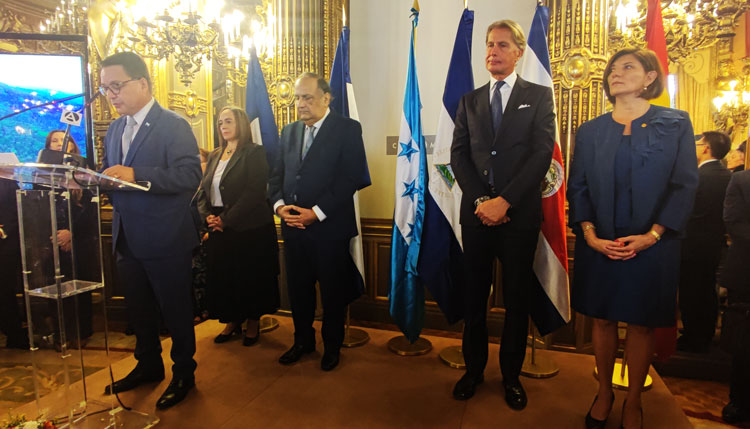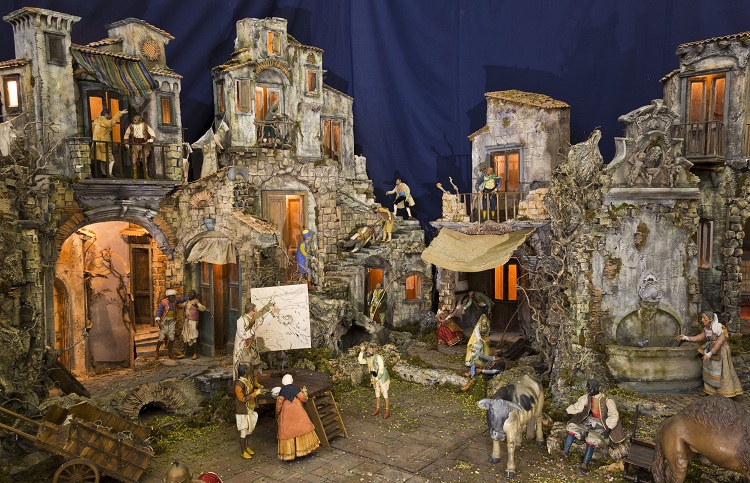Juan David Latorre
The Embassies of Guatemala, El Salvador, Honduras, Nicaragua and Costa Rica celebrated last Friday the National Day of Central American Countries, on the 202nd anniversary of their Declaration of Independence, with a reception held at Casa América, organised by the Salvadoran delegation.
The event was presided over by the ambassadors of El Salvador, Joaquín Maza; of Honduras, Marlon Brevé; of Nicaragua, Maurizio Gelli; and of Costa Rica, Adriana Bolaños, as well as the Chargé d’Affaires of Guatemala, Marlene Reynoso.
The reception was attended by most of the ambassadors from Latin American countries, as well as from other parts of the world, including the ambassadors of the United States and Canada, and the ambassadors of Switzerland, Bulgaria, Austria and other European countries. Representing the Spanish government were the State Secretary for Latin America, the Caribbean and Spanish in the World, Juan Fernández Trigo; the State Secretary for Migration, Isabel Castro; the Director General for Latin America, Enrique Yturriaga; the Director of the Spanish Agency for International Cooperation and Development, Antón Leis; the Director of Casa América, Enrique Ojeda; and several diplomats from the Ministry of Foreign Affairs. Also in attendance was the General Coordinator of the Madrid City Council, Matilde García Duarte.
After some words of welcome from the director of Casa América, spoke Juan Fernández Trigo took the floor highlighting “the essentially peaceful nature of Central American independence. An independence that led to dialogue, compromise, consensus and negotiation between its various protagonists. There is no doubt that coexistence in a plural society can only flourish when there is a basic consensus around common values and principles, which are the dignity of the person, human rights and the values of the rule of law. Among these: the democratic election of rulers”.
“Spain cannot fail to observe with concern the dangers that threaten our democracies,” continued the Secretary of State. Spain defends with full conviction respect for electoral processes, as well as for the decisions emanating from the ballot box, because this is the only way to guarantee harmonious coexistence, the foundation of all Democracy.”
Juan Fernández Trigo underlined a second major reflection on the independence process, which was “the commitment to regional integration, which crystallised in the Central American Federation. A desire for integration that has never been abandoned and that today is crucial for facing the challenges of today’s global and multilateral world.
With regard to bilateral relations between Spain and Central America, the Secretary of State highlighted “the institutional framework and the exchange of visits and high-level trips between Spain and the region. The strengthening of the democratic state is at the heart of our cooperation actions. We hope that we will soon be able to congratulate ourselves on the definitive entry into force of the EU-Central America Association Agreement, a key instrument in our relationship, and the first of an interregional nature signed by the European Union”. With regard to economic well-being, he pointed out that “we cannot and must not forget the action of companies wishing to increase their presence and invest in the respective countries. In terms of cooperation, we want to contribute to alleviating imbalances. We are one of the main donors in the region, financing programmes that promote democratic institutions, gender equality, support for indigenous groups, journalists and human rights defenders. Cooperation has to be complementary to investment and trade because this is the only way to achieve a multiplier effect on the levels of economic welfare to which I referred earlier”.
Finally, Juan Fernández Trigo referred to emigration. “A large Central American community resides in Spain. These people bring the best of themselves to our country, they offer their efforts, but also diversity and social nuances. History, culture, migratory movements, social and economic ties, but, above all, the aspiration for a free, peaceful, fairer and more egalitarian world, unite our countries. Spain has a sincere and long-term commitment to the freedom and prosperity of Costa Rica, El Salvador, Guatemala, Honduras and Nicaragua.
The Honduran Ambassador, Marlon Brevé, then addressed the guests on behalf of the five Central American embassies accredited in Spain. The ambassador highlighted “the constant concern for attending to the needs and preserving the rights of the most vulnerable population, the integral and inclusive approach to the economic and social development of our peoples, the green transition, and the digital transformation. This sustainable mission will allow our region, as a whole, better democratic development, harmonious integration and awareness of internal realities. We reiterate our conviction in the importance of integration, multilateralism and international cooperation”.
The Honduran ambassador thanked “the support we have always received from Spain. Working together, our peoples will walk along better paths. The five Central American countries, together with Belize, Panama and the Dominican Republic, form part of the Central American Integration System (SICA), through which the foundations have been laid for the economic, social and political integration of the region. This mechanism has led us to achieve significant progress, for example, the ability to act as a bloc in important international, political, economic and social forums, as well as the capacity to negotiate coordinated extra-regional trade agreements, including the European Union-Central America Association Agreement, the first cooperation agreement of this type in history.
“We welcome the holding of the European Union-CELAC summit,” Marlon Brevé said, “which is a clear example of the importance that the Spanish Presidency attaches to Latin America and the Caribbean. We are sure that concrete and beneficial results will come out of this summit”.
The Honduran ambassador ended his speech by highlighting all that is good about the Central American region, “a region of encouraging prospects, where its biodiversity combines perfectly with the hospitality of its people. It is a region full of contrasts, full of diverse landscapes, images, colours, rich in gastronomy, with the aroma of coffee and sugar cane, bathed by two oceans that bring with them new waves of progressive thinking, integration, cooperation and a multilateral vision, with a shining sun that illuminates the promise of better dawns”.
Finally, Mauricio Chacón, Chief Officer of the Office of the Central American Bank for Economic Integration in Spain and Europe, made a toast to the National Holiday.












